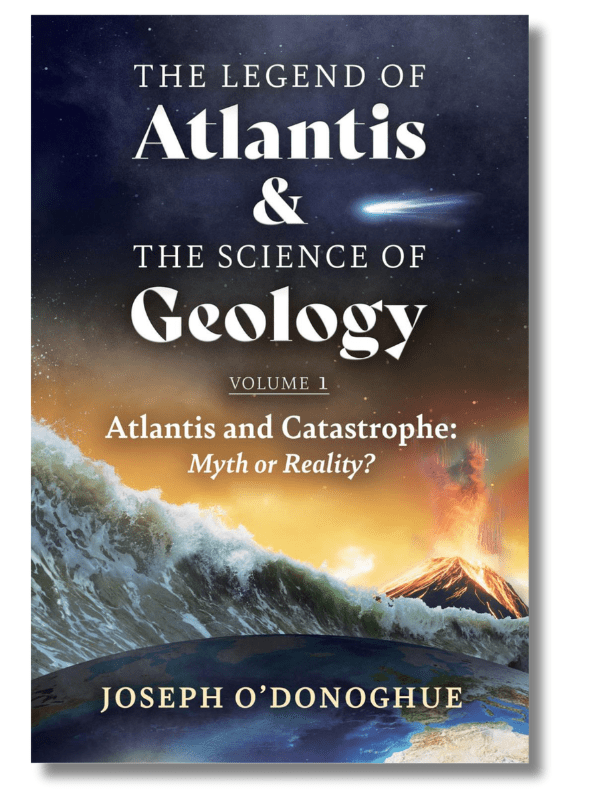The Legend of Atlantis & the Science of Geology
by Joseph O’Donoghue
Genre: Nonfiction / Science
ISBN: 9798350910278
Print Length: 376 pages
Reviewed by Erica Ball
A thought-provoking book on how the existence of the mythical Atlantis might not be as far-fetched as we’ve been led to believe
Say the word “Atlantis” and you’ll either pique someone’s interest or paint yourself as a crackpot. Well, the latter is what Joseph O’Donoghue, geologist-turned-science-critic and author of Atlantis and Catastrophe: Myth or Reality?, is trying to change.
And he’s planning on being thorough, taking a total of eight books to do it, with a series called The Legend of Atlantis and The Science of Geology. This serieswill share the results of his decades-long research into the Atlantis myth, why it’s become as controversial as it has, and whether it could nevertheless have been based in fact.
Atlantis and Catastrophe: Myth or Reality? is the first volume that delves into the Atlantis story itself, as documented by Plato, as well as how it was treated very differently by Plato’s successors and other scholars than it is today. It also includes how and when that change in attitude came about.
The concept of this series began with the author’s own disillusionment with what he saw as a closed-minded attitude within geology. While he ended up leaving that career, he never lost his interest in geology. Also long intrigued by Atlantis and whether the sinking of such a place was possible from a geological standpoint, his personal interest led to decades of reading and researching that branched into disciplines as varied as philology, classics, archeology, comparative mythology, physics, astronomy, and more.
His research reinforced his impression that the geological establishment had bought too far into one theory of natural forces, to the extent that they had to close their eyes to any facts that contradicted it. As a result, they had made themselves blind to obvious and observable phenomena that their theory could not explain.
The theory in question is uniformitarianism, which is the idea that the forces at work in the natural world (like erosion) haven’t changed over time, and so everything we observe must have an explanation that is still at work. It also means that changes happen very slowly and gradually. On the surface, this seems logical, but problems arise because it simply cannot explain everything. There are some events we know happened, like the Ice Age, that are not explainable by this theory, or that can only have occurred by massive catastrophes.
Once uniformitarianism is questioned, a lot of topics become less taboo, like the possibility of the sinking of a mythical landmass. And once his research began, the author found there was plenty of evidence that it could well have happened just as Plato described.
And it’s not just the Atlantis myth that then becomes a potential avenue for scientific inquiry, but ancient legends from all over the world that deal with great floods, fires, and earthquakes, all of which have been summarily dismissed as nonsense because there is no room for such possibilities under uniformitarianism.
The author argues, in short, that the actual observable facts of the world have taken a backseat to ideology or the egos of the people involved, that knowledge passed down through the ages has not been properly explored because it posed a threat to the scientific establishment, rather than due to a lack of merit on its own part.
So, in addition to being of obvious interest to those who are drawn to the possibility of advanced ancient civilization as offered by the Atlantis myth, this book will also be intriguing for those studying the history of the natural sciences, both ancient and modern. As it is interdisciplinary in scope, it will also appeal to readers of archeology, mythology, Egyptology, and the classics. The text is at times technical, so some familiarity with academic writing in one or more of these disciplines is recommended.
The amount of evidence within this book is compelling in scope and breadth. I can only imagine what is to come in the forthcoming volumes. It is clear that the Atlantis question, along with many others, has been too easily dismissed as a subject deserving of research.
This book joins a growing list of those who argue for a return to fact-based research and the formation of theories that actually address and explain all observable phenomena. It’s a call to return to true science, which will help us both learn from our past and inform our future.
Thank you for reading Erica Ball’s book review of The Legend of Atlantis & the Science of Geology by Joseph O’Donoghue! If you liked what you read, please spend some more time with us at the links below.
The post Book Review: The Legend of Atlantis & the Science of Geology appeared first on Independent Book Review.
